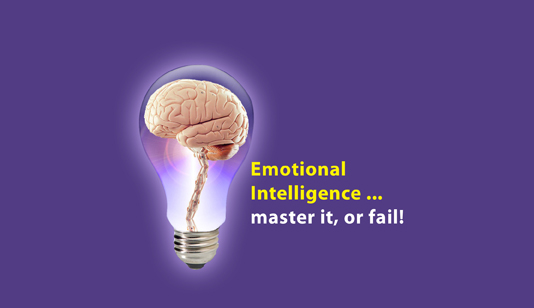Emotional Intelligence … master it, or fail!
By Karima Mariama Arthur
You’ve got an extraordinary education, a competitive skill set and premium experience. You’re an expert who is considered “best of breed” and you are comfortably making your way towards even greater success. What more could you possibly ask for?
Emotional intelligence, of course.
It’s one of those buzz phrases that’s thrown around a lot. So, let’s begin with a quick, straightforward definition: It’s your ability to be aware of, influence, and express your own emotions, and perceive and influence those of others in the context of interpersonal relationships.
Psychologist and author Daniel Goleman enumerates the specific components of emotional intelligence as self-awareness, self-regulation, motivation, empathy and social skills in his Harvard Business Review article, “What Makes a Leader?”
These components can help you to perceive nuance, communicate, and behave more intelligently. They can also make or break your ability to lead with clarity and competence.
Here’s a closer look at each component:
Self-awareness
While there is a universe of emotions out there, our ability to identify and connect with them is what helps us to become self-aware. Do you understand your emotional triggers and how to recognise them when you are feeling a certain way? What about in others? Your ability to determine and better understand emotional states, both in yourself and others, is the starting point for being able to influence them in the future.
Self-regulation
Being able to identify and understand emotions is one thing. But being able to exercise control over them is a different matter all together. We have mood swings, but are you able to control or redirect yours? What about stopping yourself from blurting out those angry words in the midst of a heated argument? Or storming out of your boss’s office after receiving some embarrassing, but necessary constructive feedback? Your ability to exercise control in this area is critical to interpersonal relationships and how others perceive you.
Motivation
Do you have a vision for your success, fueled by an internal passion that keeps you focused and excited about achievement? Optimistic drive and persistence, coupled with the ability to overcome odds in the face of adversity makes the difference between people who succeed and those who do not. Your ability to develop this trait from the “inside out” put you in the driver’s seat and keep you fully accountable, rather than make excuses and blame others for your lack of performance.
Empathy
Do you have a strong sense of compassion and exercise sensitivity towards others? Are you able to separate out your own biases when you consider the viewpoints and personal circumstances of others? Your ability to appreciate different perspectives is especially important when you function in a leadership role. Single mindedness often results in shortsightedness. In an ever-changing and increasingly heterogeneous global society, being open-minded and developing a more comprehensive world view is the foundation for embracing the concepts of tolerance, diversity, collaboration and yes, even innovation.
Social Skills
As humans, we are inherently in the business of creating and maintaining relationships in nearly every facet of our lives. Thus, it should come as no surprise that this is an area requiring significant attention. Communication Expert, Michele Gilliam Morrissey, M.A., CCC-SLP notes that “The research is becoming increasing clear on this simple truth: We are literally created to connect.” This begs the question: Are you able to quickly and easily connect with others by starting conversations and building a rapport? Of rapport, Morrissey says, “Establishing rapport makes way for an ‘advanced deposit’ of credibility that provides the benefit of the doubt.” In high stakes business scenarios, it’s an important aspect of social currency. But so is your ability to use emotion and persuasion to lead teams, navigate complex social situations and exercise etiquette. Without this skill, you may find that your IQ and technical expertise pale in comparison, especially if you intend to lead others.
Fundamental reasons why business leaders should master emotional intelligence
With a better understanding of emotional intelligence under your belt, let’s examine why it matters in the context of business leadership.
- Self-examination is essential
The willingness to be vulnerable, discover and improve upon your own weaknesses is an inescapable pillar of effective leadership. Self-awareness fuels this aspect of emotional intelligence. But self-awareness also helps you to identify behavioural nuances in others, discover their bright (and blind) spots, as well as prescribe relevant solutions. Strong perceptive abilities help you to establish and maintain credibility and create the context for modeling the behaviour you seek to develop in your team. By confronting your own strengths and weaknesses, you can create a more accurate blueprint for reflecting excellence.
- Communication is the hallmark of effective leadership
“It is simply impossible to become a great leader without being a great communicator,” says Mike Myatt, a leadership advisor to Fortune 500 CEOs and Forbes columnist. Your ability to effectively communicate your vision (or that of the organisation you serve) will affect your ability to lead and empower others to embrace change. As a business leader, you are always poised to communicate—something. A keen awareness of your emotions, motivation and the susceptibility of others to your message is necessary to advance your value proposition and inspire others to take decisive steps forward.
- Creating and maintaining healthy relationships is non-negotiable
As a business leader, your ability to cultivate interpersonal relationships will determine whether people feel drawn to you—and ultimately desire to work with you now or in the future. As the social skill component of emotional intelligence that likewise assumes empathy, developing relationships is an important aspect of the human experience. To be sure, you need charismatic appeal (and a healthy dose of altruism) to successfully connect, influence and lead others.
4٫ Good decision making is the foundation for long-term success
Because others depend on you for guidance and expertise—especially in times of uncertainty—understanding how your emotions affect your thinking and behaviour is absolutely essential. Self-regulation helps you to think clearly (especially in highly charged scenarios), process stimuli more fully, observe the “devil in the detail” (as well as see the big picture), and of course exercise some degree of flexibility because you are not operating from knee-jerk assumptions. As a business leader, your long-term success depends on clear thinking and a history of solid decision-making.
5. True grit powers results
Angela Lee Duckworth, assistant professor of psychology at the University of Pennsylvania, considers “true grit” a highly relevant performance metric, just as critical as IQ. She defines it as, “the tendency to sustain interest in and effort toward very long-term goals.” Successful business leaders know that it takes more than mere good intentions to achieve results. Internal motivation, passion and persistence (especially when faced with the pain of adversity), are all necessary and prescriptive components of true grit, which help to create a straight path towards success. On the whole, it is very difficult for business leaders to experience success on any level without the motivation to achieve results.
Improving Your Emotional Intelligence
Emotional intelligence is a critical leadership skill set that is cultivated over time. By consistently nurturing it, everyone, regardless of background, education or experience, has the potential to become better.
Here are a few key ways that you can improve yours:
Self-awareness
You can increase self-awareness by challenging yourself to identify and experience a more complete range of emotions on a daily basis. Part of this process can be escalated by simply being more sensitive to emotions as they arise. Over time, you will discover key distinctions that will serve you and help you to further develop your emotional wheelhouse. However, you should also strive to become more skilled at identifying and understanding the emotions of others. It will eventually help you gain insight into the thinking and behaviour of others as well.
Self-regulation
Learning to exercise control over your thinking and behaviour takes work, but with discipline and consistent effort, it can be done. Instead of reacting to stimuli on a whim, make a conscious decision to be more proactive. Focus on creating the best outcomes. Take the time to seek out a more thoughtful response. When faced with a decision, consider the possible options, as well as their consequences. These steps will help you to craft better responses to external stimuli, rather than embrace default reactions based on whimsy.
Motivation
If you’re serious about making progress in any area of your life, then know this: You need intrinsic motivation to rev up the old action engine. You can help yourself out by determining whether you are moved most by the carrot or the stick. Do you find the promise of a reward or the fear of punishment most useful? Whichever works best for you is the best method to adopt.
Empathy
You can improve this competency by simply being more thoughtful about the way that you engage others. Practice seeing situations from different perspectives. Try being less judgmental and sincerely giving others the benefit of the doubt. Another great way to cultivate empathy is to practice active listening 2 during daily conversations. This will likewise enhance your ability to develop rapport and create mutual understanding.
Social Skill
It’s nearly impossible to avoid human contact, so why not make it work to your advantage? Social competence is a multi-faceted process comprised of various facets (conversation, complex communication, networking, collaborating, social etiquette, conflict resolution and more) and although you may attempt to work on an individual skill, cross over will naturally occur. So, practice listening, engaging in meaningful conversations, collaborating, negotiating—and even executing common courtesies, whenever possible. You may think of these things as common-sense activities, but experience teaches that they are anything but.
Business leaders take heed: You can reap tremendous benefits from cultivating emotional intelligence. While cognitive and technical expertise may be a condition precedent to becoming an expert in your field, soft skills mastery is the linchpin that drives long-term success. Why not give yourself every competitive advantage?
Karima Mariama-Arthur is the founder and CEO of Word Smith Rapport, an international consulting firm located in Washington, D.C. that specializes in professional development. She trains, coaches and consults for individuals and organizations on the dynamics of complex communication and high-performance leadership competence.




























